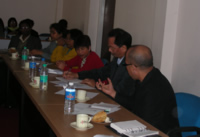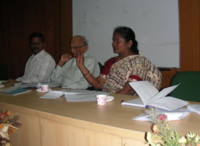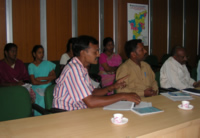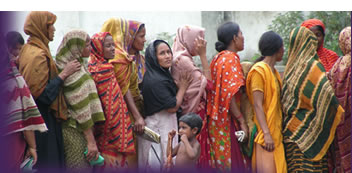The project team shared the methodology and findings of the pilot study with the IFAD project team and other stakeholders in three workshops organized at Shillong (Meghalaya), Chennai (Tamil Nadu) and Bhubaneswar (Orissa), respectively. The discussions focused on three specific questions.
- How is this approach different from the existing approaches used in the design and implementation of programmes for rural women?
- What is the potential for using these guidelines in designing gender-sensitive programmes for rural women
- What needs to mainstream these guidelines in the design process
Meghalaya (2 Feb 2009)
 The workshop at Meghalaya was held at Shillong with the MRDS (Meghalaya Rural Development Society). The MRDS together with the Government of Meghalaya is implementing the IFAD-funded project on "The Livelihoods Improvement Project for the Himalayas". Participants included representatives from the MRDS, including members of the gender team, different line departments and gender specialists from other NGOs working in the region. The workshop at Meghalaya was held at Shillong with the MRDS (Meghalaya Rural Development Society). The MRDS together with the Government of Meghalaya is implementing the IFAD-funded project on "The Livelihoods Improvement Project for the Himalayas". Participants included representatives from the MRDS, including members of the gender team, different line departments and gender specialists from other NGOs working in the region.
The salient points that emerged from this meeting are as follows:
- Similar design experiments (such as the case study on Mawphlang block in East Khasi Hills) should be undertaken on other ethnic groups (such as Garos and Jaintias in other parts of Meghalaya) to understand the socio-economic conditions and aspirations of women and to identify best possible interventions. Within the programme, someone can be designated to handle similar studies with the support of CRISP. This would not only build in-house capacity of the programme and staff but also help in building a knowledge base.
- A demand-driven approach (as in this design process) is always better in comparison to a supply-driven approach. However, this would call for changing mindsets from top to bottom as even the communities have become so used to getting programmes/schemes that are supply-driven.
- Sharing of experiences, ideas and learning by all the partners/non-partners working in the same region/block is of great importance to supplement each others’ work/programmes/schemes towards a common goal and to avoid overlapping by different line agencies and NGOs. Strengthening networking is quite important. This is needed to bring about convergence.
- The MRDS is trying to follow a similar approach since the inception of the programme.
- Government programmes are mostly supply driven with the emphasis on targets. A qualitative assessment seldom takes place.
- This is a focused, diagnostic process of intervention. However, social aspect should complement it.
- Natural Resources (NR) are fast depleting. States such as Meghalaya that are dependant on shrinking NR have no tools to deal with the situation. Programmes should have mechanisms to address these issues.
- There should be a specialized cell collecting data at the village level as envisaged in this approach and it should be available to all the agencies working in that area.
- The approach should be incorporated in the government at the policy level only then it would be effective.
- To take this design process forward, there should be a meeting at state level with the heads of departments, involving the chief secretary.
Meghalaya Participants:
 Daniel Ingty, P.D., MRDS; A. Dohtdong, Human Resource & Gender Sensitisation (HUGS) Team; A. Kharkongor, Manager, Finance, MRDS; B.M. Umlong, Representative Dist Horticulture Office; Darilyn Syiem, Project Manager, North East Network; Dolfie Massar, Gender Manager, MRDS; G.D. Dkhar, DHO, Shillong; H.I. Blah, Coordination Officer, DMU-East Garo Hills; Jude Xalxo, Manager Rural Finance, MRDS/LIFCOM; K. Wahlang, C.O. South Garo Hills; M. Ningbri, A.A.M.O, Dist Horticulture Office, Shillong; Marlam K. Kharmudai, M & E Officer, PMU-MRDS; Melina Kharbuli, HUGS team; Patricia Mukhim, Director, IWRC (Editor, Shillong Times); Pynhom Suchiang, D.P.O ICDS, Jaintia Hills; R.G. Lyngdoh, CEO, LIFCOM (Livelihood finance company)/MRDS; Roma Jyrma, Additional Director, Social Welfare Department; S.C. Kharpuri, Assistant Horticulturist, District Horticulture Office; S.I. Lyngdoh, Coordination Officer, Jaintia Hills, MRDS; V.N Sangma, HUGS team; Vinitha Sempina, Dist Social Welfare Officer; Tahseen Jafry, Glasgow Caledonian University, UK; Rasheed Sulaiman V, Centre for Research on Innovation and Science Policy (CRISP), Hyderabad; Nimisha Mittal, CRISP Associate, New Delhi. Daniel Ingty, P.D., MRDS; A. Dohtdong, Human Resource & Gender Sensitisation (HUGS) Team; A. Kharkongor, Manager, Finance, MRDS; B.M. Umlong, Representative Dist Horticulture Office; Darilyn Syiem, Project Manager, North East Network; Dolfie Massar, Gender Manager, MRDS; G.D. Dkhar, DHO, Shillong; H.I. Blah, Coordination Officer, DMU-East Garo Hills; Jude Xalxo, Manager Rural Finance, MRDS/LIFCOM; K. Wahlang, C.O. South Garo Hills; M. Ningbri, A.A.M.O, Dist Horticulture Office, Shillong; Marlam K. Kharmudai, M & E Officer, PMU-MRDS; Melina Kharbuli, HUGS team; Patricia Mukhim, Director, IWRC (Editor, Shillong Times); Pynhom Suchiang, D.P.O ICDS, Jaintia Hills; R.G. Lyngdoh, CEO, LIFCOM (Livelihood finance company)/MRDS; Roma Jyrma, Additional Director, Social Welfare Department; S.C. Kharpuri, Assistant Horticulturist, District Horticulture Office; S.I. Lyngdoh, Coordination Officer, Jaintia Hills, MRDS; V.N Sangma, HUGS team; Vinitha Sempina, Dist Social Welfare Officer; Tahseen Jafry, Glasgow Caledonian University, UK; Rasheed Sulaiman V, Centre for Research on Innovation and Science Policy (CRISP), Hyderabad; Nimisha Mittal, CRISP Associate, New Delhi.
Tamil Nadu (4 Feb 2009)
 The workshop at Tamil Nadu was held at Chennai with the TNCDW (Tamil Nadu Corporation for Development of Women) TNCDW is implementing the IFAD-funded Tamil Nadu Post Tsunami Sustainable Livelihoods Programme (PTSLP). The workshop at Tamil Nadu was held at Chennai with the TNCDW (Tamil Nadu Corporation for Development of Women) TNCDW is implementing the IFAD-funded Tamil Nadu Post Tsunami Sustainable Livelihoods Programme (PTSLP).
The salient points that emerged from this meeting are as follows:
-
The IFAD-assisted PTSLP project has identified potential sectors that could increase the income of the beneficiaries. The programme has started with household surveys to get the baseline and this work is entrusted to facilitating/resource NGOs. This is followed by a sub-sector study to identify the forward and backward linkages. The kind of a database as envisaged in the new approach can very well be used in these kinds of surveys.
-
Most of the discussions focused around the database -- time required for data collection, feeding and analysis of data, periodicity of updates, accuracy and maintenance of database and the need for a mechanism to facilitate this activity.
-
Cluster Resource Centre at the panchayat level envisaged under the PTSLP project could undertake collection and analysis of the data provided these centres are equipped with required infrastructure such as computer facilities. It would be useful to have a guidelines or manual to structure the database.
TamilNadu Participants:
K. Balachandar, Finance and Administrative Officer, TNCWD, Chennai; M. Manohara Singh, Additional Director (CB), TNCWD, Chennai; R.Sumathi, Programme Leader, DHAN Foundation, Chennai; P.A.Viswanathan, Liaison Officer, DHAN Foundation, Chennai; S.Ramachandran, Joint Director (Monitoring and Evaluation), TNCDW, IFAD assisted PTSLP, Chennai; S.Karthikeyan, Manager, Enterprise Development, TNCDW, IFAD assisted PTSLP, Chennai; M.Prabhu, Cluster Co-ordinator, Sirulapakkam Cluster, Madras Social Service Society, Pulicat, Thiruvallur District; V.Palani, Enterprise Development Officer, Project Directorate, IFAD, Thiruvallur; A.Vasanthakumar, Monitoring and Evaluation Officer, IFAD assisted PTSLP office, Collectorate, Thiruvallur; S.Chandran, Cluster Co-ordinator, Pulicat Cluster; Madras Social Service Society, Pulicat, Thiruvallur District; Rasheed Sulaiman.V, CRISP, Hyderabad; M.S.Ashok, Cirrus Management Services Pvt. Ltd, Bangalore; N.J.Kalaivani, Research Fellow, CRISP, Hyderabad
Orissa (6 March 2009)
 The workshop at Orissa was held at Bhubaneswar with OTELP (Orissa Tribal Empowerment and Livelihood Programme). OTELP is jointly funded by IFAD, DFID and WFP. The workshop at Orissa was held at Bhubaneswar with OTELP (Orissa Tribal Empowerment and Livelihood Programme). OTELP is jointly funded by IFAD, DFID and WFP.
The salient points that emerged from this meeting are as follows.
-
The prescribed approach might potentially lead to identification and promotion of demand-led programmes. However, how far it helps in achieving the convergence remains to be seen.
-
This approach helps in tracking beneficiaries and verifying the progress as the details of beneficiaries are recorded in a database.
- Periodical updating of data is essential for all programmes. Therefore, there should be a mechanism or facility to do this.
-
OTELP is following many of the principles suggested in the proposed methodology. The programme collects baseline information, undertakes Participatory Rural Appraisal (PRA) and it has a “Process Guideline” that the officers follow in implementation of its programmes. Possibilities for organizing separate activities for men and women are also explored.
-
PRA and other mapping exercises are successful only if they are complimented with a sound database. This approach supports this task.
Orissa Participants:
Deepak Mohanty, Programme Director, OTELP, Bhubaneswar, Orissa; Suresh Chandra Pattnaik, Programme Officer (L&NRM), OTELP, Bhubaneshwar, Orissa; Gopabandhu Dash, OAS(I), Revenue and Administrative Officer, OTELP, Bhubeneshwar, Orissa; Subrat Kumar Gar, Programme Officer (CB), OTELP, Bhubaneshwar, Orissa; Pravanjan Mohapatra, Programme Officer (PM&E), OTELP, Bhubaneshwar, Orissa; Salim Gomango, Programme Officer (Capacity Building), ITDA, Th.Rampur; Bhimasen Sethy, Agricultural Officer, ITDA, Th.Rampur; Naba Kishore Parida, Agricultural Officer, ITDA, Paralekhamundi, Gajapati District; Srabani Dalal, Programme Officer (CB), ITDA, Paralekhamundi, Gajapati District; Ashok Kumar Senapati, Agricultural Officer, ITDA, Koraput; Suvendhu Kumar Dhal, Programme Officer (Capacity Building), ITDA, Baliguda; Barendra Mishra, Agricultural Officer, ITDA, Baliguda; A.Jagannadha Raju, Secretary, Centre for Community Development, Paralekhamundi, Gajapati District; Jeevan Das, WDT Member, Centre for Community Development, Paralekhamundi, Gajapati District; Amulya Kumar Khandai, PRADAN, FNGO Representative, Balliguda, Kandhamal District; Jeeben Kumar, Team Leader, Gram Vikas, Kalahandi District, Orissa; Amiya Ranjan, Deputy Project Director, OFSPD, Orissa; Durga Panda, Secretary, Jana Kalyan Ptatisthan, Paralekhamundi, Gajapati District, Orissa; Tahseen Jafry, Glasgow Caledonian University, UK; Rasheed Sulaiman V, CRISP, Hyderabad; M.S.Ashok, Cirrus Management Services Pvt. Ltd, Bangalore; N.J.Kalaivani, Research Fellow, CRISP, Hyderabad ; Nimisha Mittal, CRISP Associate, New Delhi. |


